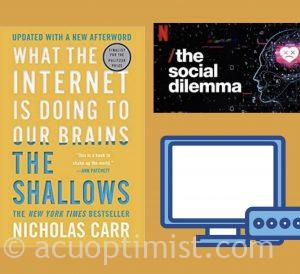Let’s talk technology. We are living in what scientists have deemed the “information age,”: essentially an era built upon a consistent stream of intelligence. This ocean spills over into several large rivers we identify as social platforms, all of which utilize a marketing strategy of engineered seduction. Gone is the world where shared media can be used singularly as a tool for connection & communication—we have entertained a much larger and much more dangerous version of intelligence, one that demands our constant attention and devotion. Are you scared yet? You should be.
This past week I’ve had the privilege of reading Nick Carr’s novel about the internet’s scientific effects on the brain. The nucleus of his work was just as I suspected: the digital network is literally rewiring our neuropathways to allow us less of an attention span and more of a self-centered focus. It’s hard to ignore science when you find yourself as the lab rat in a grand social experiment you never willingly took part in. Carr also spoke on Artificial Intelligence and its increasing humanization. He brought up a fascinating study held in the latter half of the 20th century that sought to test the limits of ELIZA, an early computer language program. The test subjects were given therapy sessions by the program, which would respond with open-ended questions after a human response. The results were just as terrifying as you would imagine–ELIZA actually helped the test subjects. This is just a small chunk of what Carr explores in his research novel but is a prime example of the rapid evolution of the digital ecosystem.
After reading The Shallows, I thought it beneficial to watch a buzzing documentary on Netflix, satirically named The Social Dilemma. Jeff Orlowski, the director of the documentary, compiled together a series of interviews from ex-employees of large corporations such as Google, Facebook, and Twitter. Most of these workers have quit their jobs because of ethical concerns. They have watched their companies express an attitude of dehumanization towards their users, specifically with how they utilize inhumane addiction tactics that are designed to profit off of the attention of each individual. The Social Dilemma reveals many other terrifying secrets about the effects of social media on the brain, self-confidence, politics, and society’s progression as a whole. At one point, former President of Pinterest, Tim Keller, was asked what he believed would be the most prevalent consequence of this digital area. He was cited saying that in his opinion, he believed civil war was becoming an increasing possibility. For our sake, let’s hope he’s wrong on this account.
So what does this mean for us? This is not new information. In fact, I’d say we’ve been hearing these statements ever since the internet was created in the ’60s. The issue now is that the negative effects of social media are no longer contained to their platforms. Both Carr and Orlowski expressed concern in their respective works, not because simply using social media would affect its user, but because it has bled into tangible society. Polarization of politics, racism, social movements—all of these elements are exacerbated by an increasing reliance on digital platforms for information. Orlowski’s documentary mentions an MIT study led by three scholars that found fake news travels at a rate of six times faster than accurate information does on Twitter. How do we navigate a world where social media is considered a primary source of knowledge? The answer, as Carr and Orlowski comment, is in our ability to discern truth. How can we solve real-world issues if we cannot accurately and unanimously sift through fact and fiction?
If you’re interested in learning how to do this for yourself, take some time to look at these works for yourself. I will warn you though–it will not coddle your misconceptions about the social network. Perhaps, if we take off the rose-colored glasses we’ve looked through for so long, we can see how that is a very good thing.

